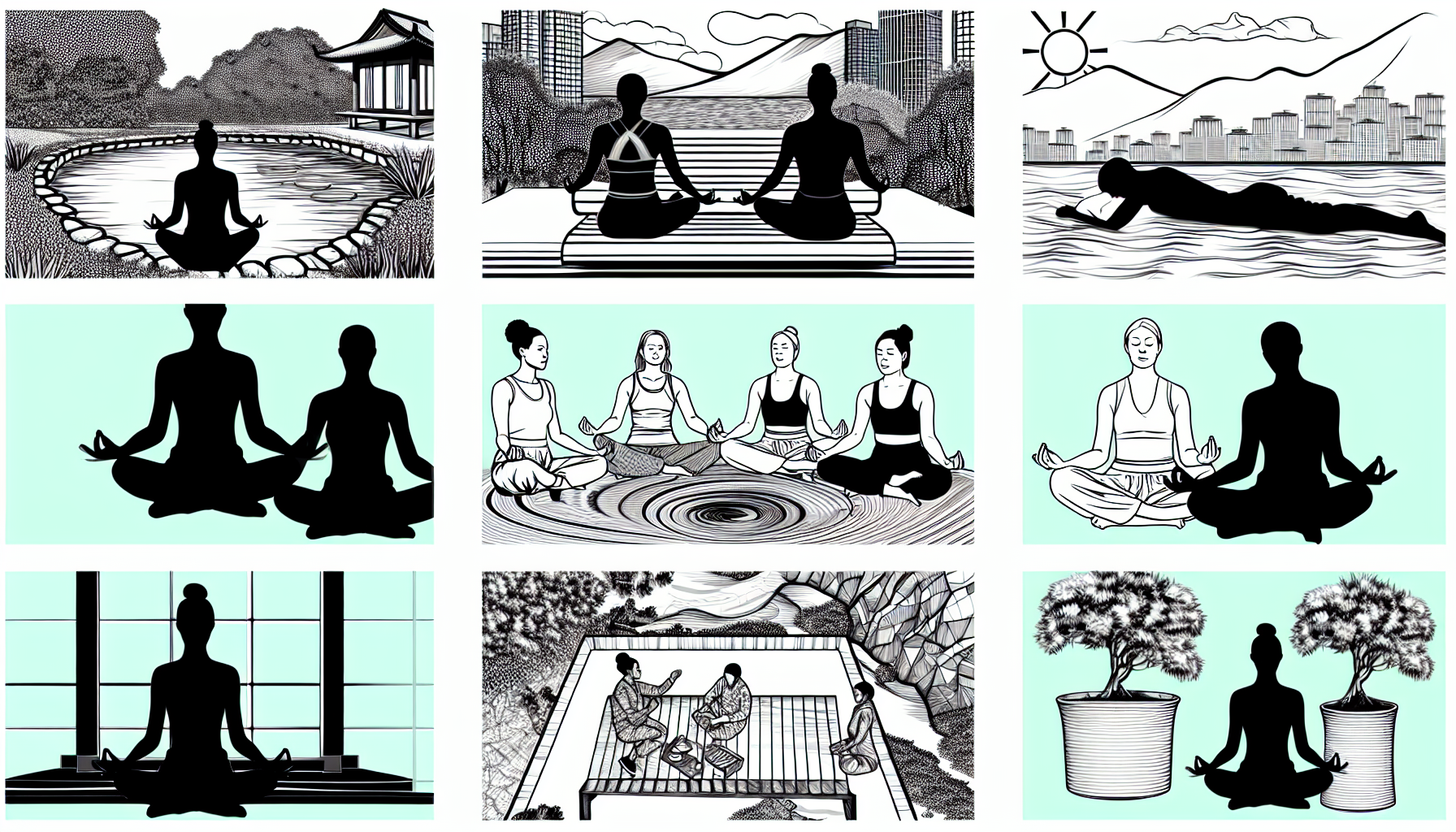Find natural techniques and lifestyle changes to effectively manage anxiety. Improve your mental health and well-being the natural way.

Anxiety management is a natural response to stress and can manifest in various forms, influencing both emotional and physical well-being. It is characterized by feelings of apprehension, fear, and unease. While occasional anxiety is a common experience, particularly in response to life events such as public speaking or job interviews, generalized anxiety disorder (GAD) represents a more pervasive and chronic condition. Individuals with GAD experience persistent and excessive worry about multiple aspects of their lives, which can disrupt daily functioning.
The causes of anxiety can be multifaceted, including genetic, environmental, and psychological factors. A family history of anxiety disorders may increase the likelihood of developing similar issues. Furthermore, significant life changes, traumas, and stressors—ranging from academic pressures to relationship challenges—can exacerbate anxiety symptoms. Neurobiological elements, such as imbalances in neurotransmitters, also play a vital role in mood regulation and anxiety responses.
Symptoms of anxiety vary by individual but commonly include restlessness, fatigue, concentration difficulties, insomnia, and irritability. Physiologically, anxiety often manifests through increased heart rate, muscle tension, sweating, and gastrointestinal disturbances. Emotionally, those suffering from anxiety may experience pervasive feelings of dread or impending doom. Cognitively, anxiety may distort thoughts, leading to excessive focus on perceived threats and a diminished ability to concentrate on tasks at hand.
Ultimately, anxiety can significantly affect daily life, impairing work, relationships, and overall quality of life. The challenge lies in recognizing when anxiety transitions from a typical reaction to a serious mental health concern requiring intervention. Understanding the fundamentals of anxiety can pave the way for effective management strategies and lifestyle adaptations aimed at fostering emotional resilience and well-being.

Managing anxiety effectively often requires a comprehensive, holistic approach that addresses various facets of an individual’s well-being. Traditional methods primarily focused on medication may relieve symptoms; however, they do not necessarily tackle the underlying causes. By integrating physical, mental, and emotional strategies, individuals can develop a more well-rounded plan to alleviate anxiety naturally.
Physical methods play a crucial role in anxiety management. Regular exercise, for instance, has been shown to release endorphins, which serve as natural mood lifters. Engaging in activities like yoga or tai chi not only provides physical benefits but also promotes mindfulness and relaxation, helping counteract anxiety symptoms. Dietary changes can also significantly impact mental health; a balanced diet rich in omega-3 fatty acids, antioxidants, and vitamins can support brain function and reduce anxiety levels.
Equally important are mental techniques. Practices such as cognitive-behavioral therapy (CBT) can assist individuals in understanding their thought patterns that contribute to anxiety. Mindfulness and meditation practices encourage individuals to stay present, reducing overwhelming feelings associated with anxiety. Journaling and creative expression can also foster emotional insight, allowing for more profound self-awareness and stress management.
Emotional support cannot be overlooked in a holistic approach. Building a support network of friends, family, or mental health professionals can provide the necessary encouragement and understanding that individuals require. Learning effective communication and assertiveness skills enhances relationships, thus reducing feelings of isolation that often accompany anxiety.
Adopting lifestyle changes aimed at addressing anxiety holistically can provide sustainable relief, promoting overall well-being rather than merely masking symptoms. This approach not only empowers individuals to take control of their mental health but also fosters resilience, allowing them to better cope with future stressors.
Anxiety can significantly impact daily life, but implementing certain lifestyle changes can help alleviate its effects. One crucial aspect is regular exercise, which has been well-documented as an effective method for reducing anxiety levels. Engaging in physical activity releases endorphins, often referred to as “feel-good” hormones, that can enhance mood and decrease stress. Aim for at least 30 minutes of moderate exercise most days of the week to experience these benefits.
In addition to exercise, maintaining a balanced diet is vital for overall mental health. Consuming a variety of nutrient-rich foods can positively affect mood and energy levels. Foods high in omega-3 fatty acids, such as fish, walnuts, and flaxseeds, have been shown to reduce symptoms of anxiety. Moreover, complex carbohydrates, like whole grains and vegetables, can help stabilize blood sugar levels, further promoting emotional balance. Reducing the intake of caffeine and sugar can also play a role; both substances may contribute to heightened feelings of anxiety in some individuals.
Establishing a consistent sleep routine is another effective strategy for managing anxiety. Lack of sleep can exacerbate anxiety symptoms, making it crucial to aim for seven to nine hours nightly. Additionally, creating a calming pre-sleep ritual—such as reading, practicing relaxation techniques, or minimizing screen time—can facilitate better sleep quality and overall emotional resilience.
Finally, cultivating a serene home environment can significantly contribute to anxiety reduction. This can involve decluttering spaces, using calming colors, and incorporating elements such as plants or soothing scents. Ensuring that your living space is a source of comfort and tranquility can help foster a sense of safety and stability, ultimately minimizing anxiety levels.
By incorporating these key lifestyle changes—exercise, balanced nutrition, a solid sleep routine, and a calming home environment—individuals can effectively manage anxiety and enhance their overall well-being.

Mindfulness is the practice of staying present and fully engaging with the current moment, free from judgment. This approach has shown significant effectiveness in managing anxiety by allowing individuals to observe their thoughts and feelings without becoming overwhelmed. The benefits of mindfulness extend to improved emotional regulation, heightened awareness, and reduced stress. Integrating mindfulness into daily life can cultivate a greater sense of control, ultimately leading to better mental well-being.
One of the most accessible forms of mindfulness practice is meditation. Meditation involves focusing one’s mind for a period, typically in a quiet environment. It can vary in duration, style, and technique. A simple, yet effective meditation exercise involves finding a comfortable seated position. You start by closing your eyes and taking several deep breaths to establish a sense of calm. Next, focus on your breath as it flows in and out, gently bringing your attention back whenever you find your thoughts drifting. Aim for a duration of five to ten minutes, gradually increasing the length as you cultivate your practice. Regular sessions can enable individuals to develop a heightened sense of awareness and tranquility.
Various meditation styles cater to different preferences and needs. For example, guided meditation uses recorded audio or live instructors to assist individuals through visualizations and affirmations, perfect for those new to the practice or seeking structure. Mindfulness meditation emphasizes quiet observation and focusing on the breath, which can help train the mind to remain present. Another popular style is loving-kindness meditation, which encourages practitioners to develop compassion towards themselves and others, fostering emotional resilience against anxiety. Engaging in any of these styles consistently helps enhance one’s ability to manage anxiety effectively.
Breathing exercises can be a powerful tool for managing anxiety in moments of distress. They promote relaxation by helping individuals focus on their breath, allowing for a greater sense of control. One effective technique is diaphragmatic breathing. This involves breathing deeply into the diaphragm rather than shallowly into the chest. To practice this method, one should place a hand on the abdomen, inhale deeply through the nose while expanding the abdomen, and then exhale slowly through pursed lips. This technique can be utilized whenever anxiety strikes, providing immediate grounding.
Another approach is the 4-7-8 breathing technique, created by Dr. Andrew Weil. This method is designed to promote relaxation almost instantly. To perform this exercise, one should inhale through the nose for a count of four, hold the breath for a count of seven, and then exhale slowly through the mouth for a count of eight. It is recommended to repeat this cycle three to four times. Individuals may find this technique particularly helpful before bedtime or during moments of acute anxiety, as it encourages the body to enter a state of calmness.
Box breathing is a third effective technique that can be practiced anytime, especially during times of high stress. This method involves inhaling for a count of four, holding the breath for another count of four, exhaling for four, and finally holding the breath again for four. By visualizing a box as one engages in this exercise, individuals can maintain focus and reduce anxiety levels. Finding a quiet space, closing the eyes, and concentrating on the breath during these exercises can amplify their calming effects. Integrating these breathing techniques into daily routines can lead to long-term benefits in anxiety management.

Engaging with nature and immersing oneself in outdoor activities can significantly contribute to the management of anxiety. Numerous studies have demonstrated the therapeutic effects of spending time in green spaces, which can promote relaxation and a sense of well-being. Nature has an intrinsic ability to restore mental energy and reduce stress, making it a powerful tool for those struggling with anxiety.
Research indicates that individuals who spend time in natural environments often experience lower levels of anxiety and depression. This phenomenon is partly attributed to the calming effects of natural settings, which can provide a much-needed respite from the hustle and bustle of urban life. Activities such as hiking, walking in parks, or simply enjoying a moment in a garden can offer substantial psychological benefits. Connecting with nature enables individuals to disconnect from technology and the demands of daily life, providing an opportunity for mindfulness and reflection.
Outdoor sports and activities further enhance mental health. Engaging in physical exercise not only promotes physical fitness but also releases endorphins, which are known to improve mood. Activities like cycling, jogging, or playing team sports can serve as effective outlets for releasing pent-up emotions, thus alleviating anxiety levels. The combination of physical activity and the soothing effects of nature creates a synergistic environment conducive to better mental health.
To integrate more outdoor time into one’s routine, consider setting aside specific times during the week for outdoor activities. Joining local clubs or community groups can also motivate individuals to explore various sports and outdoor ventures. Additionally, creating a personal sanctuary in a garden or park can provide a peaceful escape, allowing for regular doses of nature in daily life. By recognizing the power of nature and actively seeking outdoor experiences, individuals can pave the way for a healthier, more balanced approach to managing anxiety.
Building a strong support system plays a vital role in effectively managing anxiety. Social support, which encompasses assistance and comfort from friends, family, and professional networks, can significantly alleviate the burden of anxious thoughts and feelings. The first step in fostering a support network is identifying the individuals in your life who can provide emotional backing. These may include close friends, family members, or colleagues who understand your struggles and can offer encouragement during difficult times.
Open communication is key to nurturing these relationships. Expressing your feelings of anxiety to trusted individuals can create an environment of understanding and empathy. When you share your experiences, you not only gain valuable perspectives but also deepen the connections with those who care about you. Furthermore, encouraging reciprocal sharing can advance mutual understanding, making it easier for others in your network to express their own challenges. This opens the door for strengthened relationships and emotional support.
In addition to personal networks, seeking professional assistance can be a crucial component of a robust support system. Therapists, counselors, and support groups can offer tailored coping strategies and a safe space to explore your feelings. They can also provide insights and tools to help individuals navigate their anxiety more effectively. By combining personal relationships with professional guidance, one can create a comprehensive network that addresses various aspects of emotional well-being.
Ultimately, the emphasis should be on cultivating a support system that feels right for you. Whether it involves close loved ones, community groups, or mental health professionals, having a reliable foundation can foster resilience against anxiety. By maintaining open lines of communication and actively engaging with your support network, you empower yourself to manage anxiety more effectively.

Journaling has emerged as a powerful tool for individuals seeking to manage anxiety and enhance self-awareness. This practice enables individuals to articulate their thoughts and feelings, providing an outlet for emotional expression, which can be particularly beneficial during anxious moments. Through regular journaling, one can gain insights into their emotional triggers, understand patterns in their behavior, and ultimately work towards implementing constructive changes.
To begin journaling, one does not require any specific format or style. The key is consistency; designating a set time daily or weekly to reflect can create a beneficial routine. Individuals may choose various forms such as free writing, lists, or even structured prompts. Starting with simple prompts can help facilitate reflection. For instance, writing about a situation that caused anxiety and detailing the emotions felt can aid in clarifying and understanding responses to stressors. Other informative prompts can include: “What am I grateful for today?” or “What strategies can I implement to handle my feelings?” Such inquiries encourage positive thinking and motivation for finding potential solutions.
Moreover, journaling offers a safe space for creating dialogue with oneself. Individuals may explore and assess feelings deeply, leading to revelations that empower them to tackle anxiety head-on. Additionally, setting specific goals related to anxiety management and tracking progress through journaling can enhance accountability and motivation. Some may find comfort in penning down affirmations or quotes that resonate with their journey, reinforcing a more positive mindset.
Ultimately, journaling stands as a versatile tool, offering not only a means to articulate anxiety but also serving as a stepping stone toward greater emotional intelligence. Engaging in this practice regularly can contribute significantly to one’s effort in navigating the complexities of anxiety and fostering a more balanced mental state.
Nutrition plays a crucial role in influencing mental health, particularly in the management of anxiety. The foods we consume have the potential to impact neurotransmitter systems, which are responsible for mood regulation. Certain nutrients are essential for the synthesis of neurotransmitters such as serotonin and dopamine, which are pivotal in the modulation of anxiety levels. For example, foods rich in omega-3 fatty acids, like fatty fish, walnuts, and flaxseeds, are known to have anti-inflammatory properties and can support brain health, potentially alleviating symptoms of anxiety.
Moreover, incorporating a balanced diet that includes a variety of fruits and vegetables can enhance overall well-being. Antioxidants found in these foods can neutralize oxidative stress, which has been linked to anxiety. Furthermore, whole grains and foods high in fiber stabilize blood sugar levels, preventing spikes that may contribute to anxious feelings. Nutrients such as magnesium, vitamin B6, and zinc are also integral to brain health and may help mitigate anxiety symptoms when included in the diet.
In addition to dietary changes, supplements may serve as adjunct approaches in managing anxiety. Herbal supplements such as ashwagandha, chamomile, and lavender have been studied for their potential calming effects and may assist in reducing anxiety levels. Similarly, B-complex vitamins and omega-3 fatty acid supplements can be beneficial for those who struggle to obtain adequate amounts from their diet. However, it is crucial to consult with a healthcare provider before incorporating supplements, as they may interact with medications or have side effects. It’s essential to adopt a holistic approach by combining proper nutrition, potential supplements, and professional guidance to effectively manage anxiety.
Find Scholarships Offered by Countries Worldwide for Your Academic Goals.
Chose where you want to study, and we will let you know with more updates.